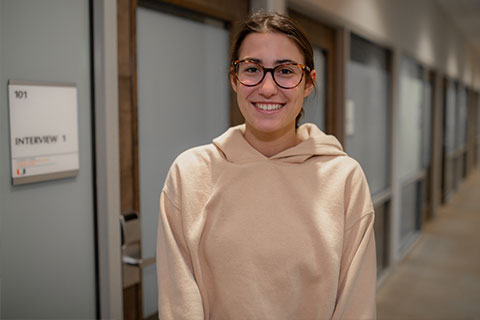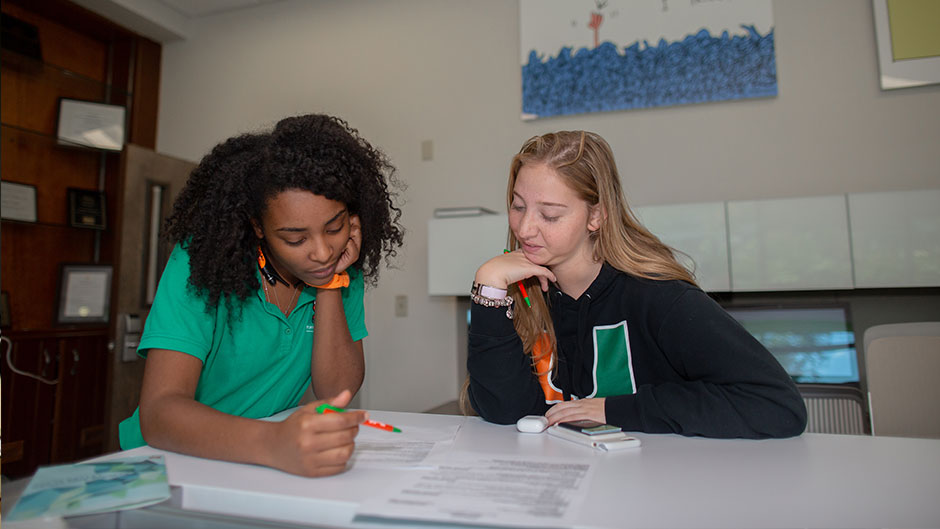When freshman Kylie Roslin started looking for part-time work during winter break, she realized her résumé needed some work and planned to make an appointment at the Toppel Career Center. When she arrived, Roslin was pleasantly surprised that an adviser was able to help her out right away.
And instead of meeting with a full-time, senior career adviser, she was able to get pointers on her résumé from a peer adviser just a few years older than her.
“I liked this experience better because it was more relaxed, but still just as effective,” said Roslin, a neuroscience major interested in becoming a medical scribe.
In the past, ’Canes in need of career advising may have had to wait three to four weeks for an individual appointment with a senior career adviser, and they were only allotted about 30 minutes at a time. Now, students and alumni are able to drop in and stay as long as they need, thanks to a new advising model adopted by the Toppel Career Center. Starting in the fall, 10 highly trained student peer advisers began helping Toppel staff on a daily basis to offer students guidance with interviewing and to navigate job search resources. They also work with students on their résumés, cover letters, personal statements, and other aspects of job or graduate school applications.
“Now we see a lot more students and they get to be seen a lot quicker,” said Morgan Henry, a peer adviser who has worked at Toppel for two years and watched the change take place.
This new framework also means that most of Toppel’s clientele no longer need appointments. The transformation has resulted in greater student satisfaction, which was the center’s goal. During the fall, more than 800 students came in for advising and 95 percent reported the advising services as helpful, said Alexandra Lord, associate director of assessment and communication at Toppel.
“We found it was hugely successful within the first month [of fall semester], and now there’s no stopping it,” Lord said.
Peer advisers said they too like the change because they never have to turn students away and they can meet with students in groups if needed, swapping between whoever needs assistance.
“Having that extended time with a student with no limits is great,” said peer adviser Christian Allen, a junior. “If they want to work in the lab for an hour and come back to me after that hour, I’ll be here to help them, or one of my colleagues will.”

If students do want to see a more senior adviser, they still can. Senior staff are always nearby to assist peer advisers and answer questions if needed, Lord said.
Toppel staff learned about the successful peer advising model when it was used at the University of Nevada-Reno to respond to a high demand for their small senior counseling team. In Nevada, the student employees’ help was so vital that now other institutions, like UM, are implementing the framework. Toppel staff spent a week last summer training the peer advisers, with ongoing training happening throughout the semester. Part of the model’s success lies in the relationships between students, said Toppel’s director of career development, Edward Cruz.
“A peer-to-peer model makes students feel more comfortable asking questions, and another benefit is that they see someone who is going through the same things that they are,” Cruz said. “Approaching your peers for advice is an important skill to utilize throughout your career, and it is one that students are gaining with this new model.”
Junior Claudia DeLorenzo agrees. DeLorenzo said she came to Toppel in the past and felt a bit intimidated by the process, but this year, she met with a peer adviser and stayed to work on an internship application for 45 minutes, taking advantage of the computers and the peer guidance while she wrote a cover letter.
“It’s a lot better to work on these things when you’re here because sometimes you need help in the middle [of a resume or cover letter],” DeLorenzo said. “It’s nice to be able to stay here.”

